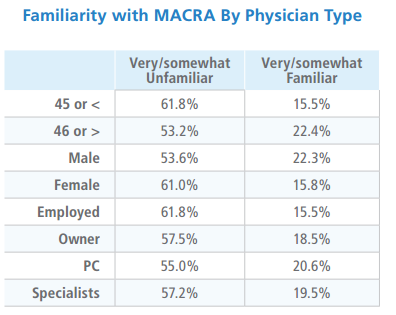20% of Surveyed Physicians Familiar with MACRA Regulations
Multiple surveys show that the majority of healthcare providers are unfamiliar with MACRA regulations.

- No more than 20.6 percent of primary care physicians and 19.5 percent of specialists are “very or somewhat familiar” with MACRA regulations, according to a survey completed in 2016 by Merritt Hawkins for The Physicians Foundation.

MACRA regulations replace the formerly flawed Sustainable Growth Rate formula (SGR) and offer Medicare providers the opportunity to participate in either the Merit-Based Incentive Payment System (MIPS) or the advanced Alternative Payment Model (APM). Commercial health payers are likely to follow the lead of the Centers for Medicare & Medicaid Services (CMS) and implement a similar structure for their reimbursement systems to reduce physician burnout and administrative burden.
As such, providers will need to understand and adhere to the stipulations of MACRA regulations. However, out of 17,236 surveyed physicians, as many as 56.3 percent of doctors are “very or somewhat unfamiliar” with MACRA regulations, according to the 2016 Survey of America’s Physicians. Out of all surveyed, about 20 percent of doctors stated being “very or somewhat familiar” with MACRA legislation.
“The new reimbursement system is likely to be followed by private payers and will represent a highly significant change to which many physicians will have to adjust,” the Merritt Hawkins report stated. “The 2016 Survey of America’s Physicians indicates that the majority of physicians do not see this change coming.”
Based on these results, commercial payers should consider working with their provider networks to offer more resources and tools to train clinicians and medical billing specialists in value-based care payment structures.
In addition, the survey shows practice owners have more knowledge and familiarity with MACRA regulations than employed doctors. While 15.5 percent of employed doctors reported familiarity with MACRA requirements, 18.5 percent of practice owners were familiar with the new CMS reimbursement system. The reason for this may be related to practice owners having more control over their medical billing and participation in MACRA.
Another 2016 survey from the Deloitte Center for Health Solutions also uncovered how employed physicians have less knowledge about MACRA legislation than independent physician practice owners. While only 9 percent of doctors employed by hospitals or health systems said they’re familiar with the law, more than twice as many - 21 percent - of self-employed physicians stated being knowledgeable about MACRA regulations.
With independent physician practice owners having greater knowledge about value-based care reimbursement and MACRA regulations, private payers could partner with individual practice owners to advance their own alternative payment models and the quality of care among their members. Through alternative payment models, commercial payers could also reduce their overall medical spending.
Additionally, 50 percent of 523 surveyed physicians said they’ve not heard of the legislation and 32 percent said hearing of MACRA but not knowing its requirements.
“The Deloitte Center for Health Solutions 2016 Survey of US Physicians found that, despite many reasons to learn about and prepare for MACRA, most physicians are still getting up to speed on this law that will likely change their Medicare payments,” according to the Deloitte report. “The survey findings suggest that the health care industry as a whole has a great deal of work to do with physicians to better prepare for MACRA and its impact. Multiple stakeholders— especially the Medicare program, physician organizations, and health systems—can support physicians as they work toward the common goal of delivering higher-quality and more cost-effective care.”
As many as 80 percent of those surveyed stated preferring fee-for-service payment structures as opposed to value-based care reimbursement models. This shows that the majority of physicians are not in favor of transitioning to alternative payment models under MACRA legislation.
The survey also showed that 74 percent of physicians feel that quality reporting is a burden and 79 percent are not in favor of linking payment with quality of care. Commercial payers could use this information to work toward reducing administrative burden among their provider networks.
Payers could focus on a few key clinical quality improvement goals and tying compensation toward a smaller set of performance metrics. Additionally, aligning value-based care payment contracts with MACRA regulations would help reduce administrative burden among providers.
One poll from the Advisory Board found that 70 percent of 30 physician groups were concerned about MACRA legislation with many respondents claiming that the MIPS and APM requirements are too complicated. Out of all surveyed, 20 percent stated being confident about meeting MACRA requirements in 2017. CMS and other stakeholders will likely need to invest in educating and preparing providers to meet MACRA requirements over the coming years.
The future for alternative payment models and MACRA legislation will depend on the education and training doctors receive in advancing toward value-based, quality care.
Image Credits: Merritt Hawkins
Dig Deeper:
How Medicare, Medicaid, and CHIP Guide the Health Payer Industry
The Progress and Challenges of the Affordable Care Act

